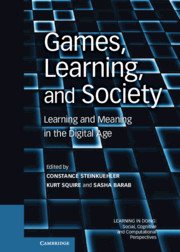Book contents
- Frontmatter
- Contents
- Contributors
- Series Foreword
- Foreword
- Acknowledgments
- Section I Games as Designed Experience
- Section II Games as Emergent Culture
- 10 Introduction to Section II
- 11 Nurturing Affinity Spaces and Game-Based Learning
- 12 Apprenticeship in Massively Multiplayer Online Games
- 13 Theorycrafting
- 14 Culture and Community in a Virtual World for Young Children
- 15 Culture versus Architecture
- 16 Participatory Media Spaces
- Section III Games as Twenty-First-Century Curriculum
- Index
- References
10 - Introduction to Section II
Published online by Cambridge University Press: 05 August 2012
- Frontmatter
- Contents
- Contributors
- Series Foreword
- Foreword
- Acknowledgments
- Section I Games as Designed Experience
- Section II Games as Emergent Culture
- 10 Introduction to Section II
- 11 Nurturing Affinity Spaces and Game-Based Learning
- 12 Apprenticeship in Massively Multiplayer Online Games
- 13 Theorycrafting
- 14 Culture and Community in a Virtual World for Young Children
- 15 Culture versus Architecture
- 16 Participatory Media Spaces
- Section III Games as Twenty-First-Century Curriculum
- Index
- References
Summary
In Section I we heard from game design luminaries on themes core to both industry practice (how designers think about the titles they create) and their role in learning (which we argue for throughout this book). Games, however, are more than designed artifacts, hewn from the creative labors of a designated team of experienced and thoughtful designers. They are, in fact, emergent cultures – social groups or organizations that share common knowledge, practices, and dispositions that emerge around a given game title. The attributes and tendencies of these cultures are not merely under the dictates of the creators of games themselves; more often than not, in fact, they surprise, if not confound, those original authorial intentions. Examples abound. Lineage II players forgo the core activity of the game, guild versus guild castle sieges, in order to ban together in cross-guild alliances to wage collective war on so-called Chinese adena farmers that they believe to be a “cancer” on their game (Steinkuehler, 2006a). LambdaMOO members establish their own forms of self-governance after an “evil clown” uses a code-based voodoo doll to rape another player’s character (Dibbell, 1993). CivIII players mobilize online to support their own learning, establishing online universities complete with deans, faculty, students, and curricula, all based on a collective desire to hone their gaming expertise (Squire et al., 2005). An enterprising PlayStation Network (PSN) user creates a fully functioning calculator within the game Little Big Planet (Pereira, 2008). If game play cannot be accounted for solely by the way that the games themselves are designed to be played but, in fact, proves contingent on player practices and norms, then what about the forms of learning we argue throughout this volume that are associated with game play itself? In other words, what role do emergent game cultures play in learning?
- Type
- Chapter
- Information
- Games, Learning, and SocietyLearning and Meaning in the Digital Age, pp. 123 - 128Publisher: Cambridge University PressPrint publication year: 2012



